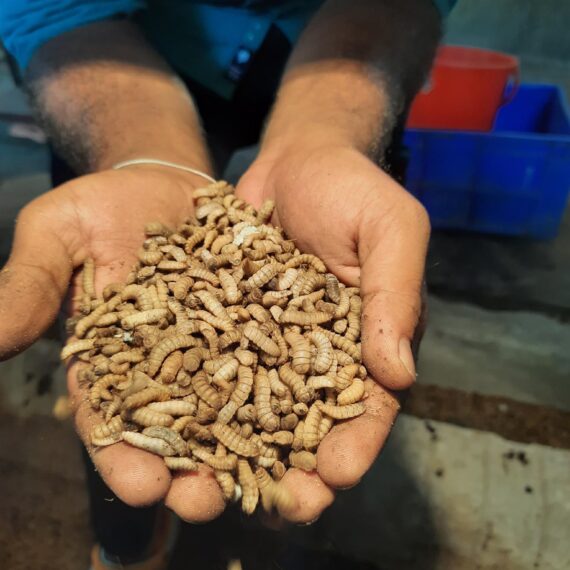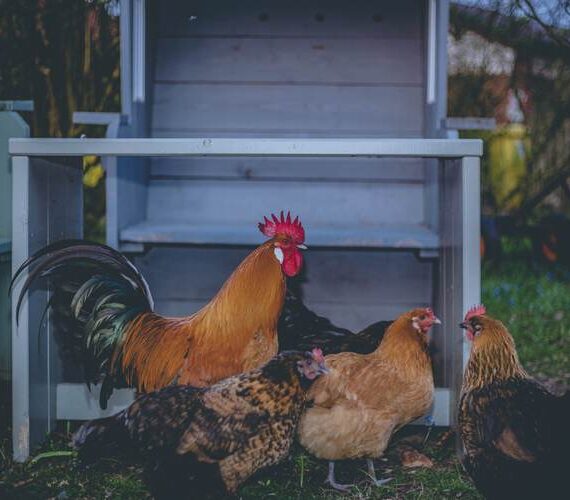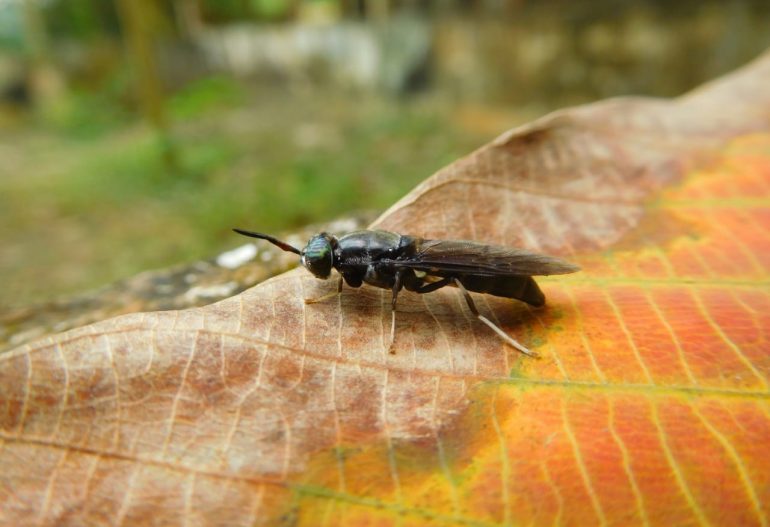An ever-increasing global population and rising demands for foods and feeds poses a challenge to global food security. The requirement for ingredients for animal feed products have drastically increased which results in scarcity of resources. The conventional feed production has much environmental impact including greenhouse gas emissions, deforestation, more natural habitats converted to agricultural land, and much more. Also, they require more water, labor, energy and time in the whole process. The environmental challenges associated with conventional feed production have driven the search for a sustainable, low-cost, high-quality alternative for animal feeds. An environment-friendly alternative to improve global nutrition and thus meeting global food and feed demand is inevitable. We analyze one such alternative-the insect protein.
 The rearing of insects and using it as an alternative protein source for animal feed is an innovative methodology in feed production. The food and feed production become more sustainable if a large population switch from traditional sources of protein to insect-based protein. Insect farming for feed production has a much lower environmental impact compared to the conventional feed production. They require less land, water, labor, time, energy and the greenhouse gas emissions associated is the lowest. The use of insects in animal diets is also an economically viable solution for feed production for small scale farmers compared to conventional feeds like soyabean and grains. This good, high-quality protein-rich feed ingredient is definitely a revolutionary step in the animal feed production. The high price of feeds which is approximately 70 percent of total expense of livestock farming business has critically distressed this field. The prices of fishmeal and soyabean have been doubled during last few years. This results in a decline in the profit margin. The demand of the consumable cereals for animal feed production poses a threat to global food security. There will be a scarcity of cereals which are also used for human consumption with the rise in human population. This will ultimately affect the quality and quantity of animal feed and results in poor nutrition in feed production.
The rearing of insects and using it as an alternative protein source for animal feed is an innovative methodology in feed production. The food and feed production become more sustainable if a large population switch from traditional sources of protein to insect-based protein. Insect farming for feed production has a much lower environmental impact compared to the conventional feed production. They require less land, water, labor, time, energy and the greenhouse gas emissions associated is the lowest. The use of insects in animal diets is also an economically viable solution for feed production for small scale farmers compared to conventional feeds like soyabean and grains. This good, high-quality protein-rich feed ingredient is definitely a revolutionary step in the animal feed production. The high price of feeds which is approximately 70 percent of total expense of livestock farming business has critically distressed this field. The prices of fishmeal and soyabean have been doubled during last few years. This results in a decline in the profit margin. The demand of the consumable cereals for animal feed production poses a threat to global food security. There will be a scarcity of cereals which are also used for human consumption with the rise in human population. This will ultimately affect the quality and quantity of animal feed and results in poor nutrition in feed production.

Another major advantage is that the insects can feed on the organic wastes generated in the households, restaurants etc. Using the organic waste as a feed to the insects and using these insects as poultry feed will be an effective solution for the waste management crisis as well. The insect cultivation process for animal feed and effectively using the organic waste as the feed for insects will simultaneously help to reduce the environmental impacts and add biological values to the waste generated. For a consistent and successful animal feed industry, the feed production must be more environmentally friendly and should leave the lowest carbon footprint in the whole process. With the considerable increase in feed production requirement, innovative manufacturing models are required. The global demand for livestock and fish feed will continue to rise in the coming years. We require a sustainable, and promising new sources and alternatives of protein-rich animal feeds. Advanced research and development are inevitable for meeting the global demand of feed protein supplies and sources.
Protein is an important component of animal feed including poultry food and fish feed. Nutritious and good quality feed help in better growth in livestock farming. Insect meal has high protein content compared to many conventional feeds such as fish meal and soyabean meal. Insect farming is cheap and can be used as an excellent substitute in aquaculture and poultry farming as feed. Including insect protein in poultry diet and fish feed improves productivity by yielding good quality eggs, growth rate, weight gain and overall development.
Black Soldier Fly Larvae – A sustainable, protein rich feed alternative
Among the insects that are reared for animal feed production, the black soldier fly (BSF) Hermetia illucens, have received much attention. BSF larvae contain high levels of protein, fat, amino acid profile and fatty acids. They are good sources of vitamins and minerals. Black Soldier Fly larvae can feed on organic waste including kitchen waste, food waste, fish waste, meat waste etc. Moreover, their ability to convert organic waste into high-protein feed is impressive and makes them stand out from other insect species. This will help in the organic waste management problem as well. The life cycle of BSFL is short and they have higher reproduction rate. They can be cultivated in a very small area with very less resources. BSF farming is definitely a profitable alternative in the animal feed production industry.
Recent Comments
If you have any questions or need help, feel free to contact with our team.
Rural Apparel Park
Thalikkulam Vikas Trust
Thrissur, 680569






